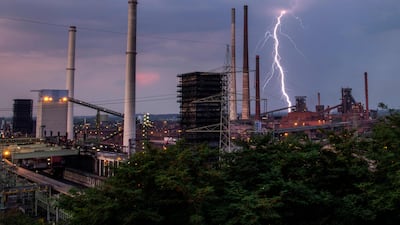Germany on Thursday announced a €200 billion ($195bn) bailout plan to protect people and businesses from the fallout of Europe's energy crisis.
The announcement came as Germany’s inflation rate hit double digits for the first time since reunification in 1990, reaching 10 per cent on the back of much higher fuel costs.
Energy prices are 44 per cent higher than a year ago, now that Russia has brought its gas exports to a standstill, and food prices have risen by 19 per cent.
Ministers are now stepping in to cap gas prices, offer direct support to businesses and abolish a heavily criticised energy levy under plans agreed to by Chancellor Olaf Scholz's coalition.
An emergency fund used to prop up the economy during the coronavirus lockdown, when Mr Scholz was finance minister, will be reactivated to cover the costs.
The fund will be filled with up to €200bn raised through borrowing until 2024, creating what Mr Scholz called a defensive shield to get Germany through the crisis.
“The energy crisis we are experiencing in Europe is threatening to grow into an economic and social crisis,” said Economy Minister Robert Habeck.
“With the decisions we are announcing today, we are preventing that.”

Mr Scholz said the apparent sabotage attack on Baltic Sea gas pipelines closed the door on any further Russian gas imports for the foreseeable future.
The announcement came after a report showed disappointing results from Germany’s efforts to save energy for winter.
A period of cold weather last week pushed household gas consumption to a higher than average level, as European countries aim for a 15 per cent reduction.
“Without considerable reductions, including in private households, it will be difficult to avoid a gas shortage this winter,” said Klaus Mueller, head of Germany’s power grid regulator.
Households face being told to stick to the bare minimum this winter if the government has to step in and ration energy, under worst-case emergency plans handed to MPs.
The gas price cap will be finalised in the coming weeks, with ministers aiming to reduce costs without eliminating all incentives to save energy, a six-page document agreed upon by the coalition showed.
“Many people and businesses in our country are facing great challenges. Prices must come down,” said Mr Scholz.

The parties also agreed to keep new regulations to a minimum during the crisis period to prevent businesses from being weighed down by unnecessary bureaucracy.
An energy surcharge for consumers, which was meant to keep businesses afloat after they had to find costly replacements for Russian gas, will be scrapped after heavy criticism.
Businesses will instead receive direct government support from the €200bn pot. Finance Minister Christian Lindner said the cost was lower than the €600bn spent during the pandemic and the €500bn spent during the 2008 financial crisis.
Mr Lindner assured markets that Germany was not emulating Britain's controversial fiscal policy, but instead buying time to revamp its energy market with more renewables and less Russian gas.
“We are explicitly not following the example of Britain on the path of an expansive fiscal policy,” he said after markets took fright at the UK’s freewheeling tax cuts.


